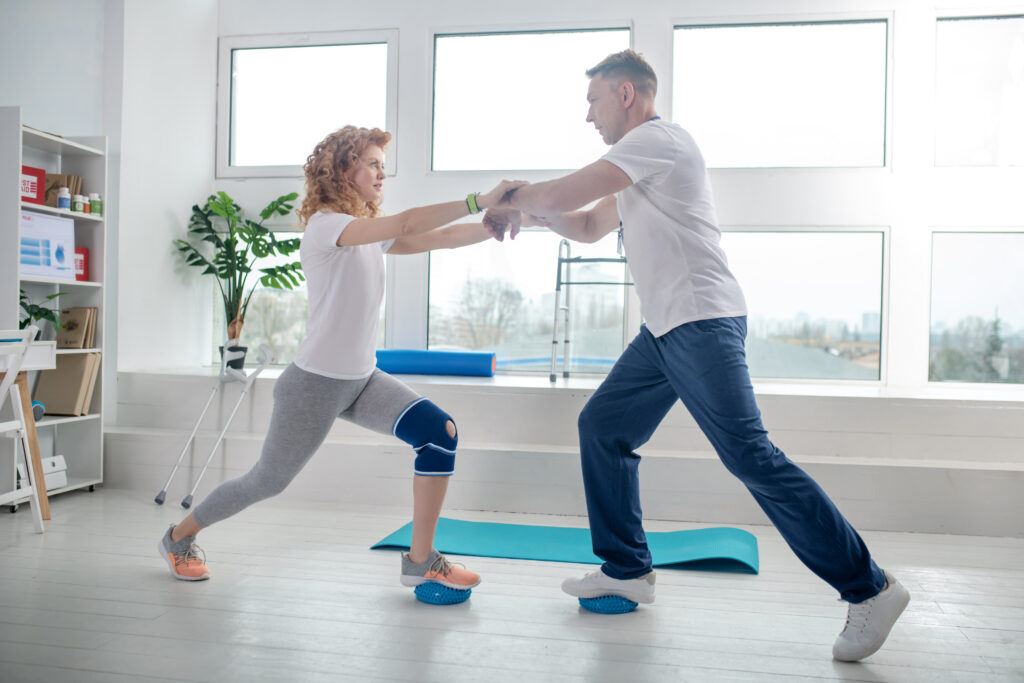Preventing falls is important for maintaining overall health and well-being, especially as we age. Falls can lead to serious injuries and significantly impact one’s quality of life. Physiotherapy plays a vital role in fall prevention by addressing balance, strength and mobility issues. We explore how physiotherapy interventions can help you reduce your risk of falling and maintain your independence.
In this blog, we’ll take a look at:
- Understanding the Importance of Fall Prevention
- Role of Physiotherapy in Fall Prevention
- Environmental Modifications and Education
- Benefits of Individualised Care
- Long-Term Impact and Independence
- Comprehensive Fall Risk Assessment
- Integration of Evidence-Based Interventions
- Collaboration and Continuity of Care
Understanding the Importance of Fall Prevention
As we age, our bodies change in ways that can affect balance and coordination. Muscle weakness, impaired vision, medication side effects and environmental hazards can increase the risk of falling. Recognising the importance of fall prevention and taking proactive steps are essential for staying healthy and active as we age.
Role of Physiotherapy in Fall Prevention
Physiotherapy programs designed for fall prevention focus on improving strength, flexibility and balance through targeted exercises. An MGS physiotherapist can assess your risk factors and create a personalised plan to address specific needs. This might include exercises to improve muscle strength, gait training and strategies to enhance overall stability.
Regular physical activity and strength-building exercises are key to reducing the risk of falls. Our physiotherapists can diagnose conditions affecting balance and prescribe exercises like squats and lunges, as well as balance drills that target core strength, lower body stability and proprioception. We also guide proper body mechanics and safe movement patterns to reduce the risk of injury.
Environmental Modifications and Education
Our physiotherapists offer advice on environmental modifications to reduce fall risks at home, such as improving lighting, removing trip hazards and installing handrails or grab bars. We can also educate you on fall prevention strategies, including safely navigating different surfaces and stairs, empowering you to take proactive steps in your daily life.
Benefits of Individualised Care
Physiotherapy’s strength in fall prevention lies in its personalised approach. Every person’s risk factors and abilities are unique, and physiotherapists tailor their interventions to suit individual needs. By taking into account your medical history, current health status and personal goals, physiotherapy can offer personalised strategies that are both effective and sustainable in reducing the risk of falls.
Long-Term Impact and Independence
By combining fall prevention strategies with physiotherapy, you can experience long-term benefits beyond avoiding falls. Improved balance, strength and mobility enhance quality of life, allowing you to maintain your independence and continue enjoying the activities you love. This proactive approach promotes physical well-being and boosts mental and emotional health, fostering a greater sense of confidence and autonomy.
Comprehensive Fall Risk Assessment
Our physiotherapists are trained to conduct thorough fall risk assessments, evaluating muscle strength, balance, gait, sensation and mobility. This helps identify specific areas of weakness that could contribute to falls. With this understanding, we can develop targeted interventions to address these factors, leading to more effective fall prevention.
Integration of Evidence-Based Interventions
Physiotherapy for fall prevention is grounded in evidence-based practice, meaning that interventions and strategies are supported by scientific research and clinical expertise. Our experienced physiotherapists stay updated on the latest advancements in fall prevention and use proven techniques to enhance balance, strength and mobility. By integrating these strategies into our care, our physiotherapists offer reliable solutions for reducing fall risk.
Collaboration and Continuity of Care
Fall prevention through physiotherapy often involves collaboration with other healthcare professionals, ensuring a comprehensive plan for fall prevention. Physicians, occupational therapists and caregivers may all contribute to the process. Physiotherapists provide ongoing support, monitor progress and adjust interventions as needed to maximise the effectiveness of fall prevention strategies.
Physiotherapy’s multifaceted approach to fall prevention, encompassing comprehensive assessments, evidence-based interventions and collaborative care, highlights its importance in promoting safety and well-being. By working with physiotherapists and following personalised interventions, you can actively tackle the factors that increase fall risks. These tailored programs help improve balance and strength, significantly lowering the chance of falls. Beyond preventing injuries, this proactive approach empowers you to stay active and independent, highlighting the crucial role physiotherapy plays in fall prevention.
Take the first step towards better balance and strength today. Book online today for a personalised fall prevention assessment at MGS Physio and regain your confidence in staying active and independent.
CALL NOW TO BOOK YOUR APPOINTMENT

